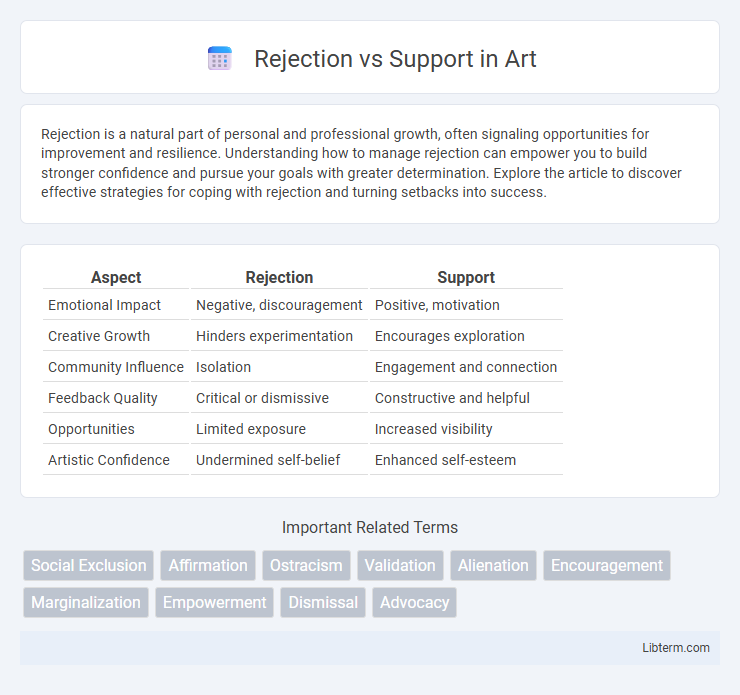Rejection is a natural part of personal and professional growth, often signaling opportunities for improvement and resilience. Understanding how to manage rejection can empower you to build stronger confidence and pursue your goals with greater determination. Explore the article to discover effective strategies for coping with rejection and turning setbacks into success.
Table of Comparison
| Aspect | Rejection | Support |
|---|---|---|
| Emotional Impact | Negative, discouragement | Positive, motivation |
| Creative Growth | Hinders experimentation | Encourages exploration |
| Community Influence | Isolation | Engagement and connection |
| Feedback Quality | Critical or dismissive | Constructive and helpful |
| Opportunities | Limited exposure | Increased visibility |
| Artistic Confidence | Undermined self-belief | Enhanced self-esteem |
Understanding Rejection and Support
Understanding rejection involves recognizing it as a psychological response where individuals perceive denial or exclusion, often triggering feelings of inadequacy or isolation. Support, in contrast, encompasses emotional, social, or practical assistance that fosters resilience and positive self-esteem. Research shows that strong social support networks mitigate the negative effects of rejection, promoting mental health and well-being.
The Psychology Behind Rejection
Rejection triggers a psychological response involving activation of brain regions linked to physical pain, such as the anterior cingulate cortex, highlighting its emotional intensity. This response often leads to lower self-esteem and increased feelings of social anxiety, influencing behavior and mental health. Understanding the cognitive and emotional mechanisms behind rejection can inform therapeutic strategies that promote resilience and social support integration.
The Power of Support in Personal Growth
Support plays a crucial role in personal growth by fostering resilience and motivation, enabling individuals to overcome challenges more effectively than rejection. Positive reinforcement and encouragement enhance self-esteem and promote a growth mindset, leading to increased learning and adaptation. Research shows that supportive relationships contribute significantly to emotional well-being and long-term success.
Comparing Emotional Impact: Rejection vs Support
Rejection triggers intense emotional pain characterized by feelings of worthlessness, loneliness, and anxiety, often activating brain regions associated with physical pain. Support, conversely, promotes emotional well-being by enhancing feelings of security, belonging, and self-esteem, thereby reducing stress and fostering resilience. Neural studies show that social support activates reward pathways, highlighting its positive role in emotional regulation compared to the distress caused by rejection.
Coping Strategies for Handling Rejection
Effective coping strategies for handling rejection include cognitive reframing to view setbacks as growth opportunities and practicing self-compassion to maintain emotional resilience. Seeking social support from trusted friends or professional counselors enhances emotional processing and reduces feelings of isolation. Engaging in mindfulness techniques and goal-setting refocuses energy on personal development, fostering long-term psychological well-being.
Building a Network of Support
Building a network of support fosters resilience by connecting individuals with mentors, peers, and resources that provide encouragement and constructive feedback. Rejection, while challenging, can motivate the expansion of this support system by highlighting gaps and opportunities for growth. Strong networks promote emotional well-being and professional success through collaborative problem-solving and shared experiences.
Rejection as a Catalyst for Success
Rejection often serves as a powerful catalyst for success by fostering resilience and innovation. Entrepreneurs and creatives frequently leverage feedback from rejection to refine their strategies and improve their work, leading to breakthrough achievements. Embracing rejection cultivates a growth mindset that transforms setbacks into opportunities for personal and professional development.
The Role of Support in Overcoming Failure
Support plays a crucial role in overcoming failure by providing emotional encouragement, constructive feedback, and practical resources. Individuals who receive consistent support from peers, mentors, or support groups demonstrate higher resilience and greater motivation to learn from setbacks. Studies show that social support significantly reduces the psychological impact of rejection, promoting persistence and improved outcomes in personal and professional growth.
Social Dynamics: Rejection and Support in Relationships
Rejection in social dynamics often triggers feelings of exclusion and decreased self-esteem, impacting mental health and social behavior negatively. Support within relationships fosters trust, emotional stability, and resilience, promoting healthy communication and stronger interpersonal bonds. Understanding the balance between rejection and support is crucial for maintaining positive social interactions and overall psychological well-being.
Cultivating Environments that Foster Support
Creating nurturing environments involves implementing inclusive practices, promoting open communication, and encouraging empathy among individuals. Organizations that prioritize psychological safety and actively address exclusion foster stronger collaboration and innovation. Research indicates that supportive environments significantly enhance mental well-being, productivity, and retention rates.
Rejection Infographic

 libterm.com
libterm.com